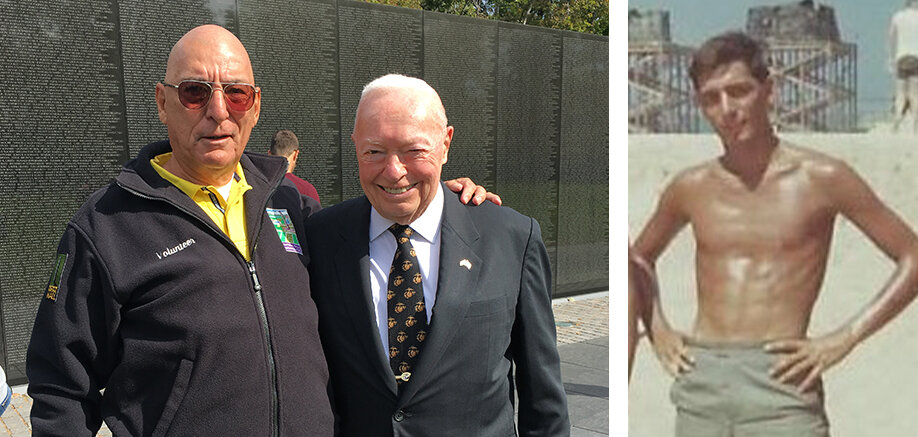Voices of Veterans and Volunteers: Hank Lazzaro
Voices of Veterans and Volunteers: Hank Lazzaro
Veteran and volunteer on the National Mall Hank Lazzaro shares the importance of these memorials to educate visitors from around the world about the sacrifices the men and women made in conflict, and to heal those who served. Lazzaro served a 13-month tour in Vietnam and was in the Marine Corps Reserves, totaling 11 years of Marine Corps service. After he graduated from law school he spent 32 years with the Navy, retiring as a Captain. He was a Staff Sergeant in the Marine Corps; when he left there to go into the Navy to be Captain, he served in the Judge Advocate General Corps. In total, he had 11 years in active-duty time and 32 years reserve time.
Left: Hank Lazzaro at the Vietnam Veterans Memorial with former Commandant of the Marine Corps General Al Gray, who passed away several years ago. Right: Hank Lazzaro at Marble Mountain in Vietnam in 1967.
Trust for the National Mall (TNM) To start, can you give me a summary of your experience in service, branch and rank?
Hank Lazzaro (HL): Sure, I enlisted in 1965 a couple months after I graduated from high school, served for three years there including a 13-month tour in Vietnam. I worked as a Chicago cop while going to college in law school while staying in the Marine Corps Reserves so that I had a total of 11 years of Marine Corps service. And when I graduated from law school I got a commission in the Navy and put in another 32 years with the Navy, retiring as a Captain. I was a Staff Sergeant in the Marine Corps and when I left there to go into the Navy, to be Captain, I served in the JAG Corps [Judge Advocate General Corps]. So all together I had 11 years in active-duty time and 32 years reserve time.
TNM: Veteran’s Days is a special time of remembrance and gratitude, what would you like visitors to take away from their time at the Mall?
HL: The service that so many veterans have given to the country, including sacrifices of those who died. When you visit the Vietnam Memorial and you see the names of the 58,279 men and women who died in Vietnam and you take a step back and realize that that’s 58,000 sets of parents, countless children, siblings, friends, and what could have become of those 58,000.
TNM: When people do come to the Mall, how do you think – we talk about the average American and general public – how do you think they can absorb and start to appreciate the sacrifices?
HL: It’s actually by engaging and talking to volunteers like myself. If you go over to Vietnam – I spend most of my time at Vietnam, I’d done some time at Korea and some time at World War II, but primarily at Vietnam [memorial] - and there are so many times that I’m engaged by people and I’m able to educate them and explain to them and let them go away with a greater understanding.
People frequently ask me if I think Vietnam was worth it. And it gives you the opportunity to explain to them the history of everything from colonialism to going back into the late 19th century up to those things that brought us into Vietnam.
I love talking to people about this stuff. I’ve spent a long time talking to one young man whose father was a north Vietnamese soldier. His father suffered from cancer from Agent Orange. It never really occurred to me that the lasting effect that what we did over there with Agent Orange, the continuing affect is on Vietnamese people to this day.
TNM: What does the Vietnam Memorial or any other memorial site mean to you?
HL: I’ll give you a personal example. When I was a Marine in Vietnam, my cousin was a Marine over there at the same time. We came back and he really never talked about anything over in Vietnam. He was somewhat antisocial, he avoided family gatherings, weddings and things, picnics, things along those lines. And it was kind of like something that was just a cloud over him, if you will.
He came out here maybe 20 years ago to visit me and I took him around to all of the memorials and we got over to Vietnam and I showed him the books where they have the names of all the people who were in it. And I asked him if there was anybody he wanted to look up.
And he stood there quietly for a moment, and he just broke down crying, “There’s too many, there’s too many.” And I talked to him and said, “Skip when you get back, go talk to a psychiatrist at the VA [Veteran’s Affairs] and just see what he has to say. And he told me when he went to see him he immediately just completely had a total breakdown and then built it up from there, if you will.
I think he still attends PTSD classes, group meetings at the VA like once a month or so. He’s now the most outgoing person. When I go back to Illinois he’s the one who organizes lunches for the cousins. He’s the one is always organizing family golf outings and such. Totally changed him. That’s just one personal example. I’ve seen so many different examples.
To all those who have served, and those who continue to serve, thank you for your service and sacrifice. The Trust is honored to be able to share some of your stories this Veteran’s Day.
Do you or the veterans in your life have a special memory from a visit to one of the memorials on the National Mall? Share it with #MyNationalMallStory @TheNationalMall and HERE.

